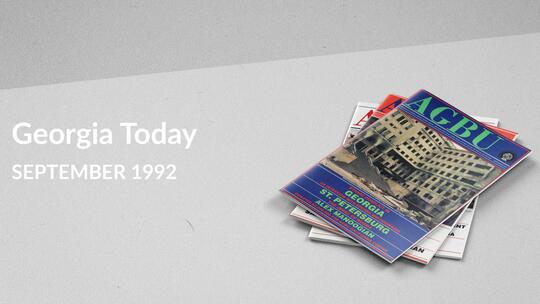by David Zenian
Tbilisi, Georgia — If name recognition is important in international politics, then the former Soviet republic of Georgia could not dream of a better man at the helm than Eduard Shevardnadze. If it wants a man with experience in local affairs, the answer is the same too. "Anyone with similar credentials, and especially in a country like Georgia, could easily turn into a dictator ... but not Shevardnadze," a western diplomat said recently. "Shevardnadze is too experienced to become a victim of his own popularity."
Returning to Georgia in January after the bloody ouster of the nation's elected President Zviad Gamsakhurdia, the silver-haired politician and one-time Secretary General of the Georgian Communist Party has found himself in an uphill struggle. Parliament has been dissolved. There is no constitution, and the government does not have a mandate from the people. Cabinet ministers can only improvise with laws left over from the communist era. In short, there are no tools for government, except the political weight and determination of Shevardnadze, the Chairman of the ruling State Council, and a handful of aides determined to steer the nation away from a collision course.
"No Georgian has the right to evade or neglect his duties and responsibilities," Shevardnadze told me during an interview in Tbilisi July 1, responding to a question whether he ever contemplated a career outside politics. Did he think of the international lecture circuit as an alternative after the collapse of the Soviet Union and his role as the Foreign Minister of one of the world's super powers? Shevardnadze smiles. "But there is another question," he replies. "And that question is whether I will succeed in this job ... I do not know, but I hope I will," he says in Russian, giving time to his personal interpreter to translate the remarks into English.
Many Georgian's share his doubts — and hopes. "This is an awkward situation. The country does not have an elected administration. This generates a lot of reluctance and uncertainty," said a western diplomat.
In Yerevan, technocrats in President Levon Ter Petrossian's government agree. "We have excellent relations with Shevardnadze and his team. But the problem is that they are somewhat hesitant in guaranteeing anything. They always stop short of giving an air-tight promise," said an unnamed Armenian official.
"One such area is transit trade. We want to use the Georgian Black Sea ports, but the problem is that the land routes to and from those ports are not exactly under the 100 percent control of the Georgian government," said an Armenian businessman. "We hope all this will change once Shevardnadze consolidates his position," he said.
The acid test comes in October when the Georgians go to the polls to elect a new Parliament. The electorate will also either give or deny the Shevardnadze administration the political mandate it so desperately needs.
Despite his pre-occupation with internal priorities, Shevardnadze has also found time to quietly engage in regional political issues like the crisis between Armenia and Azerbaijan over Nagorno Karabagh. "We have excellent relations with Armenia and Azerbaijan," Shevardnadze says. "With Armenia, we share a common fate, and also common problems — especially economic. I have had several meetings with President Levon Ter Petrossian, and we have agreed to meet again soon to finalize special arrangements regarding transit and trade."
"As for President Abulfez Elchibey of Azerbaijan ... I must say that Mr. Elchibey is new and needs time to adjust ... But I am sure we will all get together soon ... Armenia, Georgia and Azerbaijan ... In Yerevan, Tbilisi or Baku, it makes no difference to me," Shevardnadze said.
Will he act as a mediator? Shevardnadze avoids a direct answer. "We intend to continue consultations, not only regarding Karabagh, but other issues too. We have discussed matters involving some of our own problems with Mr. Ter Petrossian." Shevardnadze said.
One such problem area is Ossetia, where a secessionist movement has triggered months of conflict and fighting. Georgian officials said Ter Petrossian's prestige within the ruling circles of the various republics of the former Soviet Union was an important asset. But does Shevardnadze see a mediation role for Ter Petrossian in the Karabagh-type Southern Ossetia crisis?
"Why not," he said with a grin as he left the room.






